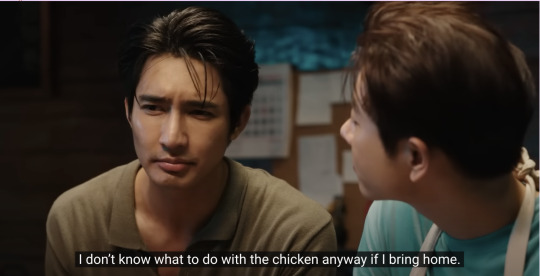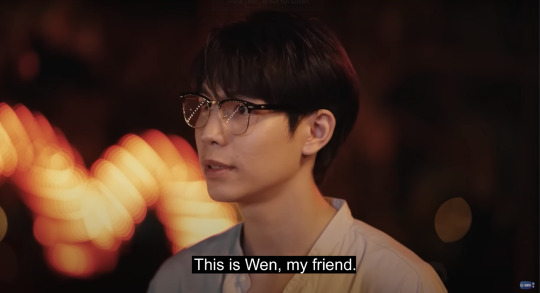#some thoughts on the anticapitalism/community care in mlc
Explore tagged Tumblr posts
Text

just as Moonlight Chicken comes to a close, i have the chance to find myself reading a book very relevant to its themes. How to Do Nothing: Resisting the Attention Economy by Jenny Odell, discusses the notion of what it means to be useful in free market capitalism and felt very poignant as I was watching MLC, both book and show placing emphasis on rootedness and responsibility to our home/ecosystem in a world where, increasingly, our space and relationships are determined by the logic of capital.
throughout the show, Uncle Jim’s arc deals with the impending closure of his chicken diner due to corporate development in the area. we soon find out the pandemic has taken a toll on businesses in this neighborhood, and that Uncle Jim offers unlimited chicken to his customers after midnight. this is later questioned by Wen, who thinks Jim could be making a bigger profit if he ditched the all-you-can-eat after midnight business model, and notes that “other diners do that.” Uncle Jim disagrees. he says: “I’m comfortable with the way I’m doing it.” he thinks in terms of the larger ecosystem of his community: of the food waste (where we know big corporate chains like Starbucks have to dump good food at the end of each day), of the usefulness of his economic role beyond bringing him a profit.

Wen’s profit drive and his participation to the development of the Marina food court is shared by a few others in the MLC world: from the neighborhood local landlord to Gaipa’s mom. throughout the show, we feel the pressure of smaller players having to learn to adapt to grow in order to survive.
related to capitalist growth, Odell’s book says, “in the context of health and ecology, things that grow unchecked are often considered parasitic or cancerous. Yet we inhabit a culture that privileges novelty and growth over the cyclical and regenerative. Our very idea of productivity is premised on the idea of producing something new, whereas we do not tend to see maintenance and care as productive in the same way.”
economic growth in the universe of Pattaya, the Marina food court construction, Wen’s promotion, are all intertwined with the challenge of the same capitalist growth mindset at the level of interpersonal relationships: Wen chasing for a confirmation of his status with Jim, Li Ming’s struggle to determine his next step towards economic sufficiency, Heart becoming deaf and his parents’ reaction to essentially hide him away from society (with the implication that disabled individuals are a dissonant surplus in a society that functions by triaging its weakest).
the theme of leaving and starting anew is also important in MLC. Jim and Jam abandon their rural origin for economic prosperity; Li Ming’s wants to do the same with America. Wen leaves his relationship with Alan and Leng discusses the possibility of an abortion for his child with Praew. it stands out, therefore, that almost every character completes their arc not by leaving and starting anew, but by learning how to make use of what they have. Li Ming locks in his plans to leave not out of economic necessity, but out of the desire to help Heart. Leng and Praew stick together to raise their child despite economic difficulties.

notably, instead of cutting off ties, Wen and Alan leave room for friendship based on the mutual recognition of their past together and a relationship based on maintenance and care, which is important especially for queer people who may be estranged from biological family (it’s not lost on the viewer that Alan has no one but his sister-in-law to help with moving out). homophobic members of family are however muted and de-emphasized; MLC is much more interested in spotlighting Gaipa’s mom and Jam coming to terms with their sons’ sexualities.

it’s also no wonder that at the end of the show, we don’t find Uncle Jim overhauling his life to create a different economic reality for himself. he is instead content to be providing for his newly enlarged family, as well as the rest of the community, as he repurposes his diner into a food truck. he parts ways with us on the following note: “I choose to sell Chicken Rice because it’s a simple dish consisted of four components: rice, chicken, broth, and sauce. It might only have four units, yet everyone’s definition of ‘delicious’ differs. Some love to eat chicken skin. Some love chicken thighs. Some don’t eat it with the sauce at all. Some love the hot broth. That’s what makes this simple dish stand out.”
and in a world where capitalism tells us to disrupt and innovate, this is, in fact, counterculture: the idea that a simple dish like chicken and rice shouldn’t be changed. that it is already great in and of its own, though it can look differently for everyone; it only requires us to have the right perspective and outlook to see its value. as Jim contemplates this throughout the show, it could be that the ‘right person’ and the ‘right time’ is right there in front of you, or at least that’s what i think that is what MLC tells us. that instead of fleeing and searching for growth elsewhere, the most radical act you can take against capitalist displacement is to firmly plant your roots where you are; to renew, regenerate, restore and rekindle your relationship to those around you, to your community and, most importantly, to yourself.

#some thoughts on the anticapitalism/community care in mlc#moonlight chicken#moonlight chicken meta#long post#bl.txt
55 notes
·
View notes